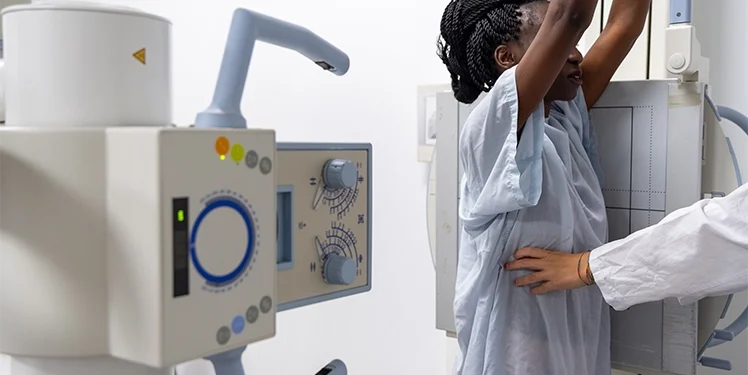April 23, 2025 Story by: Editor
A recent study led by Dr. Marissa Lawson, assistant professor of radiology at the University of Washington School of Medicine, reveals that Black women are significantly less likely than white women to receive same-day biopsies following abnormal mammogram results—even at facilities equipped to provide immediate follow-up care.
The retrospective study analyzed data from over 1.1 million women aged 40–89 who underwent more than 3.5 million screening mammograms between January 2010 and December 2020. The study spanned 136 screening facilities across six U.S. states, all part of the Breast Cancer Surveillance Consortium. Participants self-identified as white (68%), Black (13%), Asian (10%), Hispanic/Latinx (6.5%), and “All others” (2%).
“When the radiologist identifies an area of the breasts on the mammogram that does not look like normal breast tissue and cannot be categorized as a benign finding, additional evaluation is recommended,” said Lawson. “That would be considered an abnormal screening mammogram.”
“We’re looking at how the diagnostic workup process might contribute to the population disparities we see with breast-cancer outcomes,” added Lawson. “It was surprising to find similar availability (of technologies) across racial and ethnic groups. But we still saw big differences in who was getting those same-day services.”
The study found that Black women were significantly less likely than white women to receive same-day diagnostic imaging and biopsies after an abnormal mammogram.
“Our study was unable to pinpoint that. Based on our findings, it does not appear to be due to differences in the technologies available at the facilities where Black women obtain their screening mammograms,” said Lawson.
“On average, about 10 out of 100 women undergoing breast cancer screening will be recalled for further evaluation after a screening mammogram. Most of these women do not have cancer, but additional imaging and sometimes biopsies are necessary to make this determination. Among Black women, about 131 women per 100,000 are diagnosed with breast cancer each year,” she added.
In an effort to change the narrative of racial disparities for Black women in health care, Lawson believes additional research is needed.
“Additional research to identify key drivers of disparities are necessary to help develop targeted interventions to reduce disparities in breast cancer care and breast cancer outcomes,” Lawson said.
According to Lawson, outside of race, many social and economic factors likely impact access to breast cancer-related healthcare. She said that limited insurance coverage and high imaging costs can significantly hinder access to proper healthcare. Additionally, internal policies and procedures at healthcare institutions may also influence the way patients are treated.
With the multilevel analysis, the researchers hoped to shed light on how factors such as race and ethnicity, household income, and neighborhood educational attainment affected access to and use of breast cancer diagnostics.
In the study, they first identified which consortium facilities offered onsite access to both standard-care and advanced diagnostics and biopsy. They then measured patients’ access to these capabilities, discerned which screening mammograms yielded an abnormal result, and evaluated those patients’ receipt of diagnostic imaging and biopsy on the same day and within 90 days at facilities that had the technology and capability onsite.
“The Breast Cancer Surveillance Consortium (BCSC) is a network of breast imaging registries conducting research to assess and improve the delivery and quality of breast cancer screening and related patient outcomes in the United States,” said Lawson. “Individual imaging facilities across several states contribute imaging and pathology data to the BCSC to make this research possible.”
While Lawson said that breast imaging facilities must provide patients with a summary of their results within 30 calendar days of their screening examination, due to the Mammography Quality Standards Act (MQSA), a federal law regulating the quality and safety of mammography services, which mandates that facilities provide patients with a written report, or “lay report,” summarizing the results in easy-to-understand language within 30 days. This helps ensure patients have direct access to their results and can engage in informed decision-making about their breast health. She believes that there is still more work that could be done to work towards eliminating the delay and racial disparity that Black women face in health care.
“In my opinion, increased coverage of breast imaging examinations by health insurance companies would help remove financial barriers to timely resolution of abnormal breast imaging examinations. In addition, facilities can actively review and update their processes to ensure they are providing equitable care to all patients,” Lawson said. “For example, facilities can provide patient navigators to help patients make and keep necessary appointments.”
Lawson said it is important to raise awareness for the racial disparities that Black women face in healthcare because they are dying from breast cancer at higher rates compared to White women.
“Despite advances in breast imaging and breast cancer treatment, Black women continue to die from breast cancer at higher rates compared to White women. We need to understand disparities in the entire care pathway from screening, diagnosis, and treatment to survivorship to be able to reduce breast cancer mortality for all women and eliminate the gap between Black and White women,” said Lawson.
Source: Seattle Medium
















